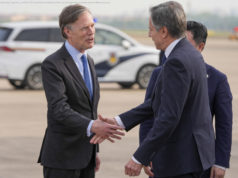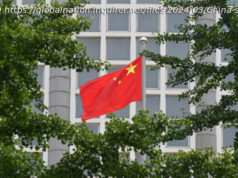Stability remains Beijing’s primary concern.
When the China Insurance Regulatory Commission announced last week that it was seizing Anbang Insurance Group Co., the only surprise was that it took so long. Last year, the company was told to sell its overseas assets, its founder was placed behind bars, and banks were ordered to stop offering its products. So what, if anything, does this latest incident tell us about China’s economy and its attempt to crack down on debt?
Anbang is often referred to as an insurance company, but this is misleading. Although the company does offer some run-of-the-mill products, such as property and casualty insurance, what really drove its growth were unusually structured life-insurance products. At the end of 2016, shortly before regulators intervened, property and casualty premiums made up a mere 4 percent of the group’s revenue. Life insurance made up 96 percent.
The growth in this business stunned even China analysts accustomed to tales of fabulous growth. From 2010 to 2016, Anbang’s annual life-insurance premium revenue increased from 1 million yuan to 114.2 billion yuan, or total growth of 11 million percent. Even during a period of rapid economic expansion, annualized growth of 593 percent is amazing.
The problem was that the life-insurance products were actually high-yielding debt instruments; investors could opt out of the insurance portion in as little as two years. With some products yielding more than 5 percent in the first three years, this essentially made Anbang a highly leveraged investor taking on significant risks to cover its cost of capital. Customers were basically extending loans to Anbang that it used to overpay for assets. Regulators finally stepped in to prevent a collapse that could have led to significant instability — with some 35 million customers demanding their money back.
In their 2011 book “Reckless Endangerment,” Gretchen Morgenson and Joshua Rosner note that the 2008 subprime mortgage crisis in the U. S. was driven partly by a perverse symbiotic relationship between Washington and Wall Street. Because boosting homeownership was an explicit goal of policy makers, regulators had an incentive to look the other way as banks made dubious loans.
Anbang’s rise had a similar dynamic. Less than two years ago, it was one of many companies that China was urging to invest internationally. The government even suggested industries for these behemoths to focus on, such as technology, real estate and finance. Emboldened by this unofficial mandate, Anbang went forth and bought up assets around world, often on disadvantageous terms. Its debt levels implied that the company needed to earn a return on assets of close to 10 percent to meet its obligations. Now financial regulators will run the company for at least a year as its assets are sold and its finances are stabilized.
American regulators and politicians made many bad decisions before and after the 2008 financial crisis, but they ultimately realized they couldn’t — and shouldn’t — bail out all firms and individuals that were in trouble. Eventually, they allowed many banks to fail and home prices to plummet. This was painful, but it allowed for asset values to adjust and enabled a slow but steady recovery that lasts to this day.
Don’t expect China to do the same. Despite rhetoric about improving risk pricing and allowing more corporate failures, the government continues to bail out risky behavior by firms and consumers. Investors consequently act as though debt is implicitly guaranteed and home values will rise at near double-digit rates in perpetuity. This will prove costly: Anbang and HNA Group Co., another teetering conglomerate, combined hold assets estimated at between $450 billion and $500 billion. But for the Chinese government, financial costs remain far less concerning than the political risks of allowing significant bankruptcies — and there’s no indication that will change any time soon.
To contact the author of this story: Christopher Balding at cbalding@phbs.pku.edu.cn
To contact the editor responsible for this story: Timothy Lavin at tlavin1@bloomberg.net






